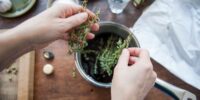How To Lower Blood Pressure Naturally With Herbal Remedies?

High blood pressure, also known as hypertension, is a prevalent health condition that affects a substantial portion of the population. It is a chronic condition that can lead to serious health complications if left unmanaged. While there are various pharmaceutical options available to manage high blood pressure, there is growing interest in natural remedies, particularly herbal remedies, as a way to lower blood pressure.
This article aims to explore the benefits of herbal remedies in lowering blood pressure naturally and provide practical strategies for incorporating them into daily routines. Additionally, it will discuss lifestyle changes that can support blood pressure management and the importance of monitoring and tracking blood pressure levels. It is crucial to note that while herbal remedies may offer potential benefits, there are potential risks and side effects to consider. Therefore, consultation with a healthcare professional is recommended before initiating any herbal treatment.
Key Takeaways
- Herbal remedies like hawthorn, garlic, olive leaf extract, and celery seed have shown potential in lowering blood pressure.
- Consultation with a healthcare professional is recommended before starting any herbal treatment.
- Hawthorn extract has been found to significantly reduce both systolic and diastolic blood pressure readings.
- Omega-3 fatty acids and coenzyme Q10 supplements can support heart health and lower blood pressure.
Understanding High Blood Pressure
High blood pressure, also known as hypertension, is a chronic medical condition characterized by elevated levels of force against the walls of the arteries, often resulting in serious health complications if left untreated. It is a major risk factor for heart disease, stroke, and kidney problems.
While medications are commonly prescribed to manage high blood pressure, many individuals seek natural remedies and alternative treatments as a means of reducing their blood pressure levels. Natural remedies such as dietary changes, regular exercise, and stress reduction techniques have been found to have a positive impact on blood pressure. Additionally, certain herbal remedies, including garlic, hawthorn, and green tea, have shown promising results in lowering blood pressure.
However, it is important to note that these natural remedies should be used in conjunction with medical advice and monitoring to ensure their effectiveness and safety.
The Benefits of Herbal Remedies
This paragraph will discuss the benefits of herbal remedies in relation to blood pressure management.
One herbal remedy that has been studied for its effects on blood pressure is hawthorn. Research suggests that hawthorn may help lower blood pressure by relaxing blood vessels and improving blood flow.
Garlic is another herbal remedy that has been found to have potential benefits in regulating blood pressure. It contains compounds that may help relax blood vessels and reduce inflammation.
Olive leaf extract is also believed to have potential benefits for blood pressure management. It contains compounds that may help relax blood vessels and reduce oxidative stress.
Lastly, celery seed has been studied for its role in blood pressure management. It may help lower blood pressure by increasing urine production and reducing fluid buildup.
Hawthorn and its Effects on Blood Pressure
Hawthorn has been found to have a positive impact on blood pressure levels, making it a potentially effective herbal remedy for lowering blood pressure naturally. Research on hawthorn has shown promising results in its ability to lower blood pressure.
Some studies have found that hawthorn extract can significantly reduce both systolic and diastolic blood pressure readings. Additionally, hawthorn has been found to improve blood flow and dilate blood vessels, which can further contribute to its blood pressure-lowering effects.
The dosage of hawthorn may vary depending on the form of the supplement, with typical dosages ranging from 160-1800 mg per day. However, it is important to consult with a healthcare professional before starting any herbal remedy, including hawthorn, to determine the appropriate dosage and ensure its safety and effectiveness.
Garlic as a Natural Blood Pressure Regulator
Garlic, a commonly used culinary ingredient, has been studied for its potential as a natural regulator of blood pressure. It is believed that the sulfur compounds present in garlic, such as allicin, may have beneficial effects on blood pressure levels. Several studies have shown that garlic supplements can help lower both systolic and diastolic blood pressure in individuals with hypertension. The exact mechanism through which garlic exerts its antihypertensive effects is not fully understood, but it is thought to involve relaxation of the blood vessels and inhibition of certain enzymes involved in blood pressure regulation. While garlic supplements have shown promising results, it is important to note that they should not replace prescribed medications without consulting a healthcare professional. Overall, garlic supplementation holds potential as a natural remedy for hypertension, but further research is needed to fully understand its effectiveness and optimal dosage.
| Pros | Cons |
|---|---|
| Potentially lowers blood pressure | May cause bad breath |
| Widely available and affordable | Can interact with certain medications |
| Natural remedy with minimal side effects | Individual responses may vary |
| Can be easily incorporated into the diet | Optimal dosage is not well-established |
Olive Leaf Extract and its Potential Benefits
Olive leaf extract has been studied for its potential health benefits and has shown promising results in various areas of research. When it comes to blood pressure regulation, olive leaf extract has been found to have beneficial effects. The dosage of olive leaf extract for lowering blood pressure varies, but a common recommendation is to take 500-1000 mg of the extract daily. However, it is important to note that individual responses may vary, and it is advisable to consult with a healthcare professional before starting any new supplement regimen.
In terms of potential side effects, olive leaf extract is generally considered safe when taken within the recommended dosage. However, some people may experience mild gastrointestinal symptoms such as stomach upset or diarrhea. It is always recommended to monitor your body’s response and discontinue use if any adverse effects occur.
Celery Seed and its Role in Blood Pressure Management
Celery seed, a commonly used spice in culinary dishes, has been the subject of research regarding its potential role in managing blood pressure levels.
Celery seed contains various bioactive compounds, such as phthalides, flavonoids, and coumarins, which have been associated with numerous health benefits.
Studies have suggested that celery seed may have antihypertensive properties, potentially helping to lower blood pressure levels naturally.
The mechanisms behind this effect are thought to include vasodilation, diuretic activity, and inhibition of angiotensin-converting enzyme (ACE).
Additionally, celery seed may help reduce oxidative stress, inflammation, and improve lipid profiles, all of which are important factors in maintaining cardiovascular health.
However, further research is needed to fully understand the potential benefits of celery seed and its optimal dosage for blood pressure management.
Nonetheless, incorporating celery seed into a balanced diet may be a promising natural remedy for hypertension.
Incorporating Herbal Remedies into Your Daily Routine
This discussion will focus on incorporating herbal remedies into your daily routine. Specifically, it will address key points such as choosing the right herbs and supplements, recommended dosages, and preparation methods.
When it comes to selecting the appropriate herbs and supplements, it is crucial to consult reliable sources and consider factors such as their effectiveness and possible interactions with medications.
Additionally, understanding the recommended dosages and proper preparation methods will ensure the optimal benefits of herbal remedies in your daily routine.
Choosing the Right Herbs and Supplements
To effectively choose the appropriate herbs and supplements for naturally lowering blood pressure, careful consideration of their therapeutic properties and potential interactions with medications is necessary. When selecting herbal remedies, it is important to focus on those that have been scientifically studied and proven to have positive effects on blood pressure. Some commonly recommended herbs for this purpose include garlic, hawthorn, and turmeric. Garlic has been found to have antihypertensive properties and can help reduce blood pressure. Hawthorn is known for its ability to improve heart health and regulate blood pressure. Turmeric, with its anti-inflammatory properties, may also help lower blood pressure. In addition to these herbs, certain natural supplements, such as omega-3 fatty acids and coenzyme Q10, have been found to support heart health and contribute to lower blood pressure levels. It is important to consult with a healthcare professional before incorporating any herbal remedies or natural supplements into your routine, especially if you are taking medications or have underlying health conditions.
| Herbal Remedies for Anxiety | Natural Supplements for Heart Health |
|---|---|
| Valerian | Omega-3 Fatty Acids |
| Chamomile | Coenzyme Q10 |
| Passionflower | Magnesium |
| Lavender | Hawthorn |
Recommended Dosages and Preparation Methods
When considering the use of herbs and supplements for managing blood pressure, it is essential to carefully determine the appropriate dosages and preparation methods to ensure their effectiveness and minimize potential risks.
Recommended dosage guidelines can vary depending on the specific herb or supplement being used. It is important to follow these guidelines to achieve optimal results. Dosages are typically determined based on factors such as the individual’s age, overall health, and the severity of their blood pressure condition. It is advisable to consult with a healthcare professional or a qualified herbalist to obtain accurate dosage recommendations.
Additionally, effective herbal preparations can involve various methods such as teas, tinctures, capsules, or extracts. Each method may have different absorption rates and bioavailability, which can impact their effectiveness. Therefore, it is crucial to understand the recommended preparation method for each herb or supplement to ensure their desired therapeutic effects.
Lifestyle Changes for Blood Pressure Management
This paragraph will discuss two key lifestyle changes for managing blood pressure: maintaining a healthy diet and engaging in regular exercise, as well as incorporating stress reduction techniques.
A healthy diet, which includes consuming nutrient-rich foods and limiting sodium intake, has been shown to lower blood pressure.
Engaging in regular exercise, such as aerobic activities or strength training, can also help to reduce blood pressure levels.
Additionally, incorporating stress reduction techniques, such as meditation or deep breathing exercises, can contribute to overall blood pressure management.
Healthy Diet and Exercise
A healthy diet and regular exercise contribute significantly to lowering blood pressure naturally. When it comes to diet, incorporating heart-healthy recipes can make a difference. These recipes typically include foods that are low in sodium and high in nutrients such as fruits, vegetables, whole grains, and lean proteins.
Additionally, it is important to limit the consumption of processed foods and foods high in saturated and trans fats.
Exercise is equally important in managing blood pressure. Engaging in regular physical activity helps to strengthen the heart and improve blood flow, thus reducing the risk of hypertension. Aim for at least 150 minutes of moderate-intensity aerobic exercise, such as brisk walking or cycling, every week.
Lastly, stress plays a significant role in blood pressure management, so incorporating stress-reducing activities such as meditation or yoga can be beneficial.
Stress Reduction Techniques
Stress reduction techniques are essential for maintaining optimal well-being and promoting a healthy lifestyle.
Breathing exercises and meditation techniques are two effective methods for lowering blood pressure naturally. Deep breathing exercises, such as diaphragmatic breathing, have been shown to activate the body’s relaxation response, resulting in reduced stress and lower blood pressure. By focusing on slow, deep breaths, individuals can stimulate the parasympathetic nervous system, which promotes relaxation and helps to counteract the effects of stress.
Meditation techniques, such as mindfulness meditation, have also been found to have a positive impact on blood pressure. Regular practice of meditation has been shown to reduce stress, improve emotional well-being, and lower blood pressure levels in individuals with hypertension.
Incorporating these stress reduction techniques into daily routines can contribute to maintaining healthy blood pressure levels.
Monitoring and Tracking Your Blood Pressure
To effectively monitor and track your blood pressure, it is essential to adopt a systematic approach that incorporates regular measurements and documentation of your readings.
This can be achieved by utilizing various tools and techniques such as blood pressure apps and home blood pressure monitors. These tools enable individuals to easily measure their blood pressure in the comfort of their own homes, providing convenience and flexibility.
By regularly monitoring and tracking blood pressure readings, individuals can gain important insights into their blood pressure patterns and trends over time. This information can help identify potential triggers or factors that may contribute to high blood pressure.
Furthermore, documentation of blood pressure readings allows for effective communication with healthcare professionals, aiding in the management and treatment of hypertension.
Potential Risks and Side Effects
This discussion will focus on potential risks and side effects of using herbal remedies to lower blood pressure naturally.
Two key points to consider are interactions with medications and allergy and sensitivity concerns.
It is important to be aware that certain herbal remedies may interact with medications, potentially leading to adverse effects or reduced effectiveness of the medication.
Additionally, individuals with known allergies or sensitivities should exercise caution when using herbal remedies, as they may trigger allergic reactions or other adverse effects.
Interactions with Medications
Interactions between herbal remedies and medications should be carefully considered by individuals seeking to lower their blood pressure naturally. While herbal remedies may show promise in reducing blood pressure, it is crucial to be aware of potential drug interactions that can occur when combining them with prescribed medications. Certain herbal remedies, such as St. John’s wort and ginkgo biloba, have been found to interact with various medications used to manage hypertension. These interactions can lead to reduced efficacy of the prescribed medication or even potentially harmful effects. Therefore, it is essential for individuals to consult with their healthcare provider before incorporating herbal remedies into their blood pressure management plan. This will ensure that any potential interactions can be identified and appropriate adjustments can be made to the treatment plan for optimal health outcomes.
| Herbal Remedy | Medication |
|---|---|
| St. John’s wort | Antihypertensive medications |
| Ginkgo biloba | Calcium channel blockers |
| Garlic | ACE inhibitors |
Allergy and Sensitivity Concerns
Allergy and sensitivity concerns should be carefully considered when incorporating alternative treatments into a blood pressure management plan. While herbal remedies may offer potential benefits in lowering blood pressure, individuals with known allergies or sensitivities to certain herbs should exercise caution.
Allergic reactions to herbal remedies can range from mild symptoms such as skin rashes, itching, and nasal congestion, to more severe reactions like difficulty breathing and anaphylaxis. Therefore, it is important for individuals to be aware of their specific allergies and sensitivities and to consult with a healthcare professional before incorporating any herbal remedies into their blood pressure management regimen.
Additionally, individuals should always read the labels of herbal products carefully to identify any potential allergens or irritants and follow the recommended dosage instructions to minimize the risk of adverse reactions. Taking these precautions can help ensure the safe and effective use of natural remedies for blood pressure management while minimizing the risk of allergic reactions.
Consultation with a Healthcare Professional
During a consultation with a healthcare professional, individuals can obtain expert advice on the use of herbal remedies to naturally lower their blood pressure. Healthcare professionals have the knowledge and expertise to provide accurate information on the accessibility and effectiveness of natural remedies.
Some key benefits of consulting with a healthcare professional include:
- Personalized guidance: A healthcare professional can assess an individual’s specific health condition and recommend herbal remedies that are safe and suitable for their needs.
- Avoiding potential risks: Herbal remedies may interact with certain medications or have side effects that can be harmful. Consulting with a healthcare professional helps identify potential risks and ensures safe usage.
- Monitoring progress: Healthcare professionals can monitor an individual’s progress in lowering blood pressure and adjust the herbal remedy dosage or recommend alternative treatments if necessary.
- Holistic approach: A healthcare professional can provide guidance on lifestyle changes, such as diet and exercise, in addition to herbal remedies, for a comprehensive approach to lowering blood pressure naturally.
Consulting with a healthcare professional ensures that individuals receive accurate information and personalized guidance on the use of herbal remedies to lower blood pressure naturally.
Conclusion and Final Thoughts
In conclusion, seeking guidance from a healthcare professional allows individuals to benefit from their expertise and personalized recommendations, ensuring a comprehensive approach to managing their blood pressure. While incorporating natural remedies can be beneficial in lowering blood pressure, it is important to consider their long-term effectiveness.
Herbal remedies have been used for centuries to treat various ailments, including high blood pressure. However, their efficacy and safety may vary, and not all herbal remedies are suitable for everyone. Consulting with a healthcare professional can help individuals identify the most appropriate herbal remedies and ensure they are used in conjunction with other lifestyle modifications and medications, if necessary.
Furthermore, healthcare professionals can provide ongoing monitoring and adjustments to the treatment plan to ensure optimal results. By working closely with a healthcare professional, individuals can achieve better control over their blood pressure and improve their overall health.
Frequently Asked Questions
Are there any specific herbal remedies that should be avoided if I have certain health conditions?
Potential risks of using herbal remedies for blood pressure management include adverse reactions, drug interactions, and worsening of existing health conditions. To choose the right herbal remedy for your health condition, consult with a healthcare professional for personalized guidance.
Can herbal remedies completely replace medication for managing high blood pressure?
Herbal remedies may be used as part of a holistic approach to manage high blood pressure, but they cannot completely replace medication. The effectiveness of herbal remedies compared to medication in managing high blood pressure should be further studied.
How long does it typically take for herbal remedies to start showing results in lowering blood pressure?
The time it takes for herbal remedies to begin lowering blood pressure varies. However, it is important to note that herbal remedies may have potential side effects, such as allergic reactions or interactions with other medications.
Are there any specific herbal remedies that are more effective than others in lowering blood pressure?
The most effective herbal remedies for lowering blood pressure include hawthorn, garlic, and beetroot. These herbal remedies can be used as a complementary treatment for high blood pressure.
Can herbal remedies interact with other medications I may be taking for other health conditions?
Potential herb-drug interactions are a concern when using herbal remedies. It is important to exercise caution and consult with healthcare professionals to ensure the safety and effectiveness of herbal remedies, especially when taking medications for other health conditions. Safety precautions should be taken to minimize any potential risks.









